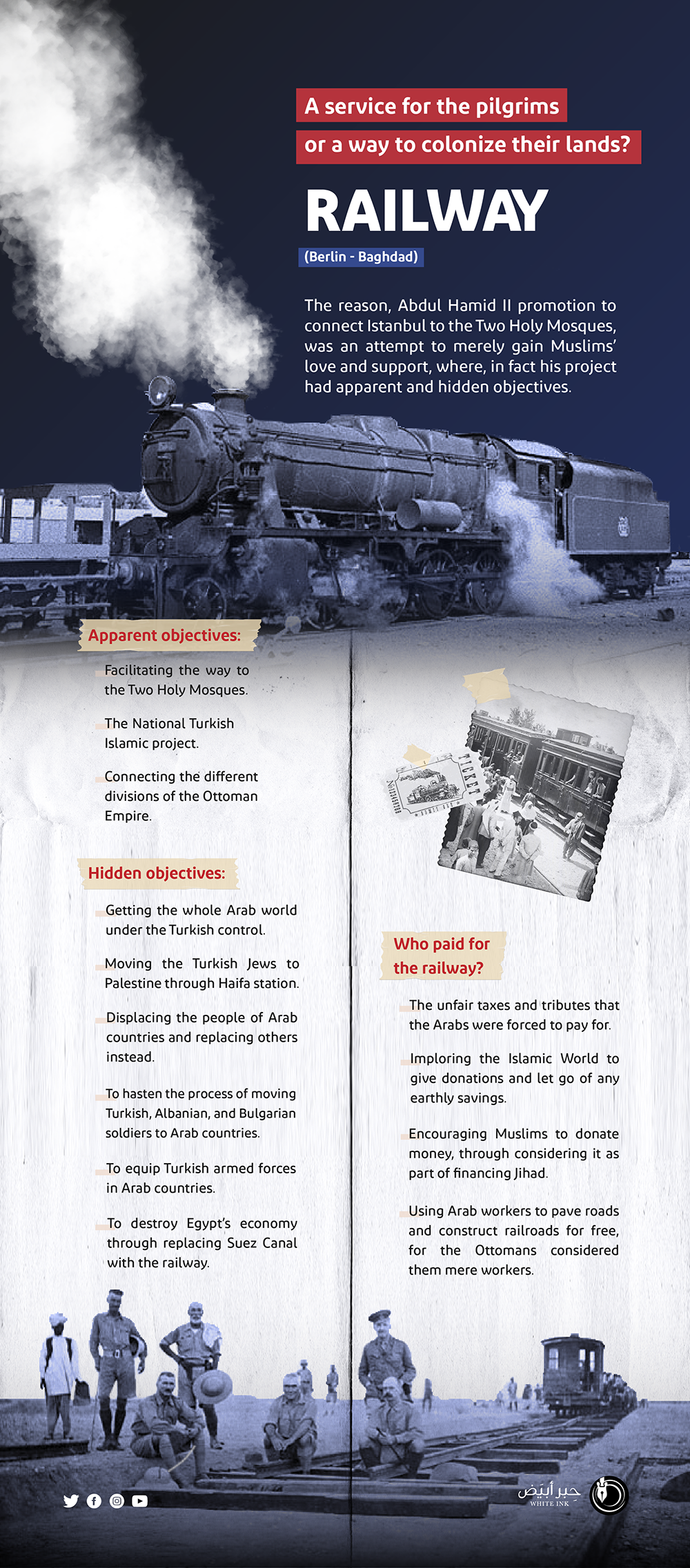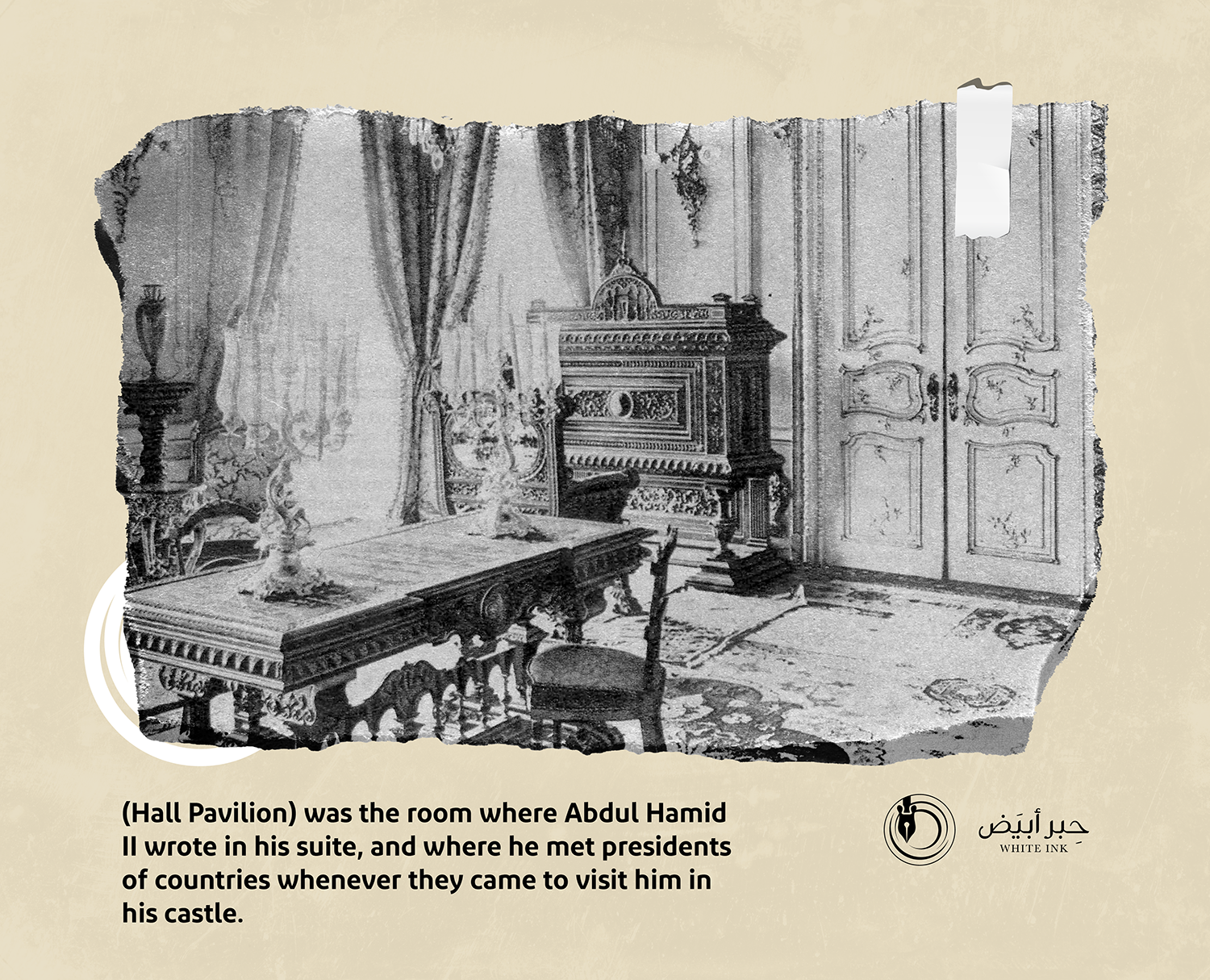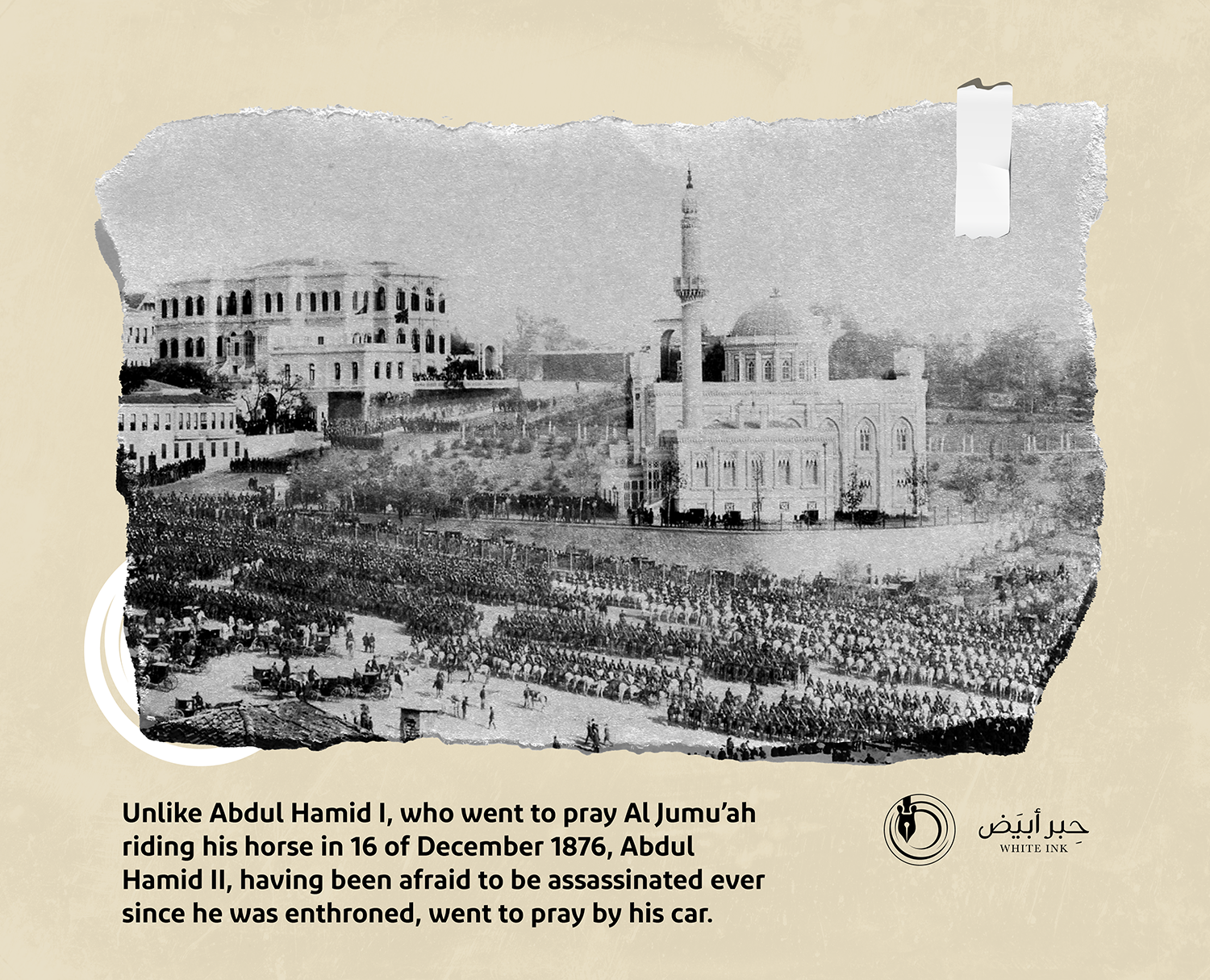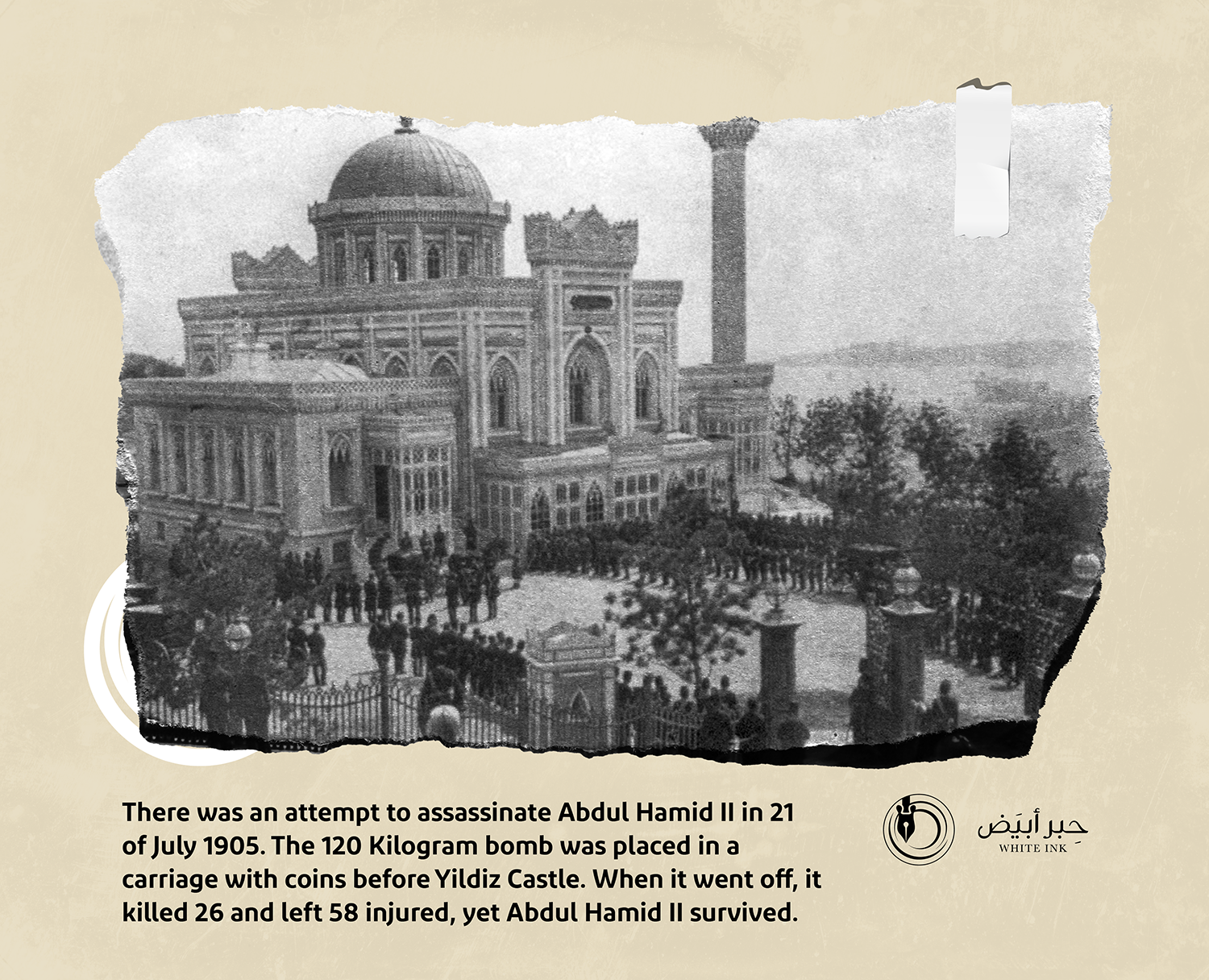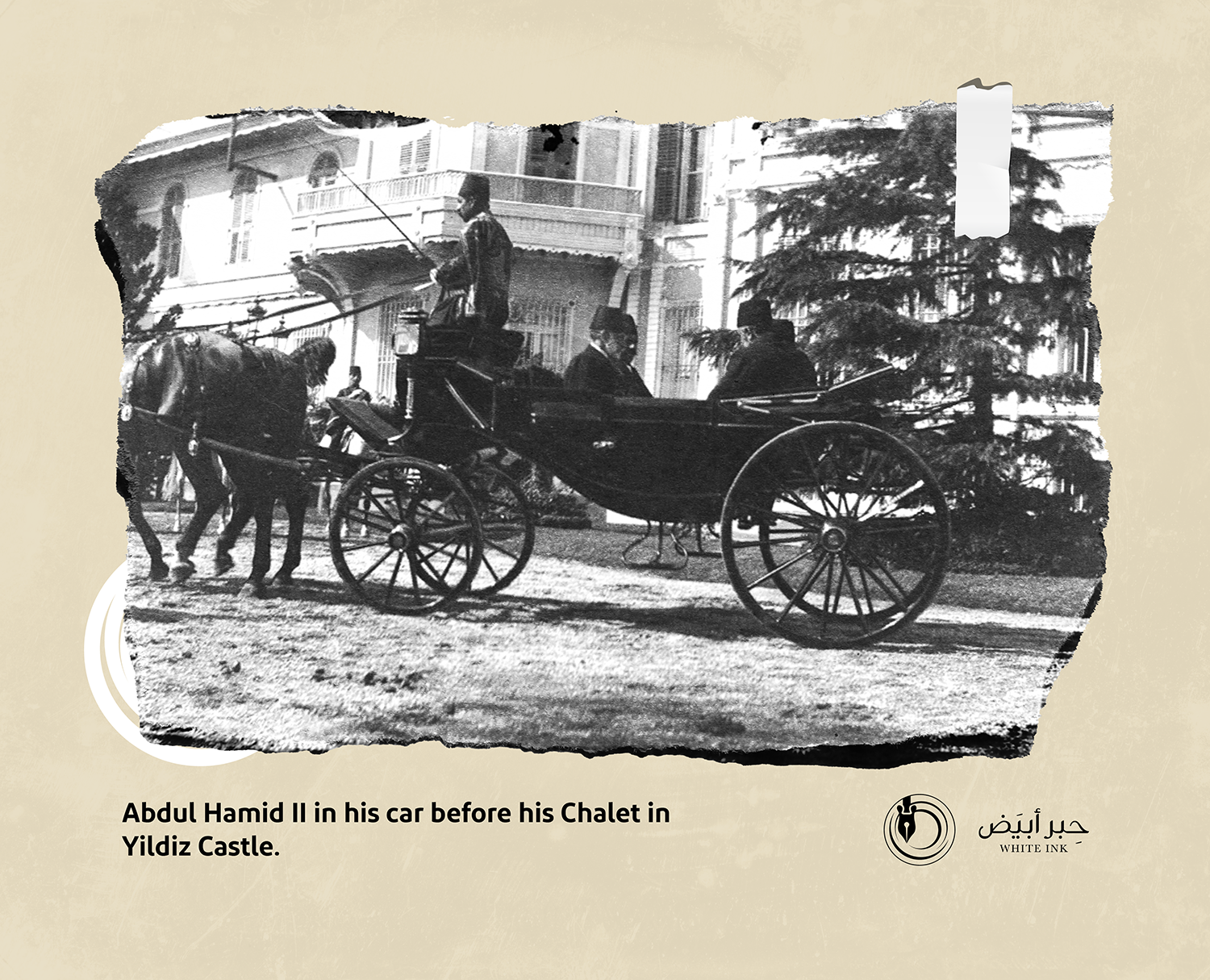
He wrote it in support of his propaganda and false righteousness
His diaries reflect his disturbed personality
Abdul Hamid II was greatly affected by what he suffered from when he was young, and this appeared in his personality in his life after that. He wrote in his diaries about his love for isolationism, and that his father left the mark of cruelty on his features when he was young, and grew up with him in the stages of his life. The Sultan affirms that he does not trust anyone, even if he makes them feel that he trusts them, but in the end, he tyrannizes his opinion. Despite this, we find that he acknowledges the fate of his state and his people to achieve multiple projects, and a change in the features of the state, such as issuing a constitution that the state did not need, as events were ravaging the world, not just the state.
The diaries of Sultan Abdul Hamid II came in five sections:
– Domestic policy.
– Foreign Policy.
– Islamic personality.
– Reform Policy.
– personality.
The first section of the diaries deals with different titles, which varied between writing about young Turks and the constitution (1892). He wrote strange phrases like: “The amount of recklessness which the Young Turks reached during the reign of my sick brother. The Ottoman Empire has declined morally and financially”. These are strange hints from him, as he made the causes of societal and economic decline is a person who was considered by everyone to be ill and irresponsible. For your information, the total term of Murad V’s rule is three months. It is reported that his uncle Abdul Aziz was deposed from the throne and then committed suicide. This happened in an atmosphere dominated by mystery – as he described – and he mentions about his brother as “Then my brother Murad went crazy and was imprisoned”.
We find that he frequently mentions the Armenians and that they are responsible for the chaos in his country, and the Turkish component in Anatolia must be promoted. Speaking about the declaration of the constitution, he says: “I have to inaugurate the council of envoys and announce the constitution to show that I am doing something important”. The weakness of the personality is evident despite the writings that are replete with the resources and repeated by the references. Several titles have been given to him, including: Caliph of the Messenger, Commander of the Faithful, Caesar of the Romans, the tyrannical master of the Oguz, the Red Sultan, and the owner of the thorn.
He wrote a letter to the Sheikh of the Shadiliya method: I raise this petition to the Sheikh of the Shadiliya method, to the wellspring of soul and life, to the sheikh of the people of his time, Sheikh Mahmoud Effendi Abi al-Shamat, and kiss his blessed hands hoping for his righteous prayers. I, with the grace of God Almighty, continue to read Shadiliya texts day and night, and I still need your heartfelt prayers”. This message was smuggled out to his Sheikh while he was in exile.
Under the title “Baghdad Railway (1898 AD)” he wrote the following: “We must work despite the restrictions of the British who are making tremendous efforts to prevent the implementation of our projects. Thanks to the Baghdad railway, the Europe-India path will return to its previous activity. If we connect this line to Syria, Beirut, Alexandria and Haifa, we will have created a new trade route. This path will not be limited to generating the great economic benefits of our empire, but will go beyond it to the military side, and it will support the strength of our army there”. Where is the rest of the world that his country controlled? Where is his slogan “Muslims of the world, unite?” But the matter is specific to the Ottomans and their Turkish nationality and their army.
Ambition was the trap of Abdul Hamid’s dreams, which he sees in his imagination, because he wrote about himself that he was a lot of imagination, and that was the reason for the character to ascend its owner and keep him away from the ground of reality.
One of the historical examples and important events that we must shed light on is his imagination, which expanded by establishing railway lines linking parts of their sultanate with all the peoples around them. The reality is that the state cannot provide a giant budget to achieve this. However, the events were quick to offer inducements and facilitate this task, that the capital has multiple sources, including the money of the Arabs that was collected unlawfully as taxes, and the Islamic world cried out for the efforts to establish an railway network that would facilitate the arrival to perform Hajj and Umrah.
He targeted the Two Holy Mosques and destroyed the Suez Canal for the benefit of Istanbul's economy.

We wonder what are the temptations that were offered to the imagination of Sultan Abdul Hamid and made him line the pages of history that he was the executor of that giant project at the time? This project will contribute to reducing the European countries ’adoption of the bloc’s policy against his country. The Sultan approved the direct work on the project, although the financial allocations, the expertise of the technicians, or even the sources of financing and many other temptations were not completed, but the broad imagination prevailed. He said, “This line will be extended and will make us not in need of the Suez Canal, and it will connect Istanbul with the holy cities of Makkah and Madinah. We will be able to secure civil and military transportation in a strong way”. This means a clear destruction of the economy of the Egyptians, in the interest of Istanbul.
The second section deals with foreign policy, as it bears a very important title that opens doors to questions, which is “The Crusades against the Ottoman Empire”. He mentioned: “The Crusades never stopped, and the old Gladstone is still following the Pope’s footsteps – and he asks – whether the state deserves these campaigns. The state harbored Christians fleeing the hell of sectarian screams in the West during the Middle Ages. The Ottoman Empire was the only refuge for Jews who survived the oppression of the Inquisition in Spain”. He did not mention the catastrophic incidents that occurred to Muslims from the same regions from which his country received the Jews and Christians.
In the second section, titles are repeated in which there is a contradiction evident in reading every topic covered. However, he wrote about Russia and its hostility to him, as he said, important information, including: “There is one thing in common, which is that we have several million Muslims in Russia and they have people from the Orthodox Church who live in the Holy Land in Palestine and are sponsored by Russia. The inability for us to find a way of peaceful coexistence with Russia is a matter of regret”. His saying reminds us of the barter method used by his predecessors when the Muslims of Andalusia cried out for their help, but he did not regret that.
He admitted that the Ottoman Empire was the only refuge for the surviving Jews of Spain.

In the third section, he chose to talk about the Islamic personality, and he dealt with conflicting headings such as: Islam is a religion of civilization and tolerance – and by that he meant tolerance of marriage to non-Muslim women – as if he was issuing a fatwa to allow this even though Islam did not forbid it. Here is the strange behavior of his personality and religious thought, as he says: “Destiny is a word that has always harmed people and caused them to suffer misfortunes, and there is no place in the Qur’an for the idea of destiny. Rather, it has become popular in recent centuries by people because of their laziness and lack of understanding. The saying of God willing (Insha’Allah) has become a refuge for everyone who wants to conceal his weakness and lethargy”. Then he talks about the subject of trust and that the Messenger, Peace be upon him, ordered Muslims to rely on God. It is a strange matter that shows his lack of knowledge of the texts of the Qur’an. We will not consider it strange, as the Shadiliya method dominated his thought. Allah says in the Holy Qur’an: “so fear Allah. And on Allah let believers put (all) their trust” [Al-Ma’idah: 11]. Allah also says in the Holy Qur’an: “To these will be allotted what they have earned; and Allah is quick in account” [Al-Baqarah: 202]. As another example from the Qur’an, Allah says: “To men is allotted what they earn, and to women what they earn” [An-Nisa: 322].
He also mentioned fanaticism. Although he and his predecessors are among the most fanatics to their race and supremacy, he refuses to be described as fanatic by Europe.
He wrote about the caliphate and the Shiites saying: “It is a matter of regret that no cooperation has taken place between us and Iran, and it should have sought rapprochement with us in order not to become a toy in the hands of Russia and England”. Among the reasons for that hostility and waste of previous eras without rapprochement is that the stage was a stage of war of interests, and the state was harmed by the policy of its sultans and their arrogance.
The fourth section is devoted to education of the Ottomans, artistic development and literature. The recurring question here: Where is the discussion about other state bodies? Through his diaries, he proved the extreme neglect of the Arab countries in particular and the Islamic countries in general. He mentioned the privileges under the title “The Rights of Nations”, as he criticizes the press, complains about it, and questions the reliability of its news. The reason for that is that she was revealing the tricks of his country. The press and journalists have been met with a fierce blackout and denial of it. What is happening today is like the past, “Erdogan and the press”.
The fifth section is about his personality, although he explained it through his writing style for the previous sections. He has devoted a title on ” personality “. He mentions that he suffers criticism for his isolation, and hates those who criticize him because they know how he grew up in bad circumstances in terms of his brothers’ cruelty to him. The strange thing is that he watches them during the fun and does not participate with them even though he wrote about his brother Murad’s treatment of him and describes his brother as poor. He appears troubled every time he mentions his brother Murad and his end, and blames everyone who could not understand him. He seemed to be surrounded by suspicion that once he ascended the throne, he found himself surrounded by people who wanted to tie him to the nets of intrigue. This is one of the customs of the ancestors of the Ottoman house, and the harem of the Sultan “Haremlik”. This suspicion indicates that he has hidden facts about the killing of his uncle Abdel Aziz and the madness of his brother Murad. He concludes by talking about the palace and mentioning the statesmen and their diversity, and that he repeatedly suspected everyone.
He moves to talk about music, the pieces of music donated to him from different nations and nationalities, and that he was not able to give them the gifts like his predecessors, and was satisfied with decorations and texts of praise, and this confirms the empty treasury. In spite of that, he speaks in the title of ” the miserly Abdul Hamid ” that he amassed a huge fortune that he hid outside the country – meaning Germany – because the banks in Istanbul are not safe. He documents his words by saying: “There is no reason to be surprised, as every ruler does what I have done”. The last headlines were about espionage, and the French publications that cost him a lot, he says: “The Greek journalist Nicolaides, who lives in Paris, gets huge sums of money from us every year in order to publish his newspaper (Notre Organ). We had to understand the importance of indifference to gossip, and the medals that we distributed as if they were decorative tools should be distributed to some journalists so that they would be on our side, because if they won these medals, they would be our voice everywhere. But it is too late and thousands of newspapers are on the opposite side”. He bemoaned the behavior of his country and his period of rule. He regrets that he supported foreign newspapers in order to be with him, but they turned against him despite the generous funding, which is one of the reasons for the deterioration of the treasury and the bankruptcy of the state.
These are some of the behaviors of Sultan Abdul Hamid II. His diaries contain many analyzes that reveal facts that were believed to be mysterious.

Abdul Hamid II’s diary exposed his deeds
The Bribed Sultan approved Espionage and Legitimized it
The Halal bribe:
The wrong understanding, or rather the distorted interpretation, of Islamic doctrine, that Sultan Abdul Hamid II used to promote, were exposed. Bribery has been legitimized. Gifts and [Baksheesh] were given to officials to do their job, properly, or to overlook a certain violation. And [of course] we are all familiar with the disastrous consequences that would arise from doing such things. As for the Islamic doctrine, it prohibited such doing; The Prophet (ﷺ) as saying: When we appoint someone to an administrative post and provide him with an allowance, anything he takes beyond that is unfaithful dealing. It was already agreed upon that bribery is unlawful. Yet, what has the Sultan ever done to carry out such doctrine? Unfortunately, the Sultan was busy doing the opposite: legitimizing bribery to be given to officials for any ridiculous reason, as European countries used to do. He considered it a tradition.
Therefore, the Sultan’s point of view, concerning bribery, has been made clear. A poor, lower official cannot live on his salary, as it is not enough to feed his children. That’s why, he considers the bribe a right and a normal thing. Besides, bribery has been justified because the country’s economic state was quite bad, thus, the government will not be able to pay the salaries every month, hence, giving it a humane cover as it is meant to help the lower class. Besides, any government, that is facing the same terrible economic state as the Ottoman’s, according to the Sultan’s views, should do the same.
He has written in his diary:” in fact, bribery is a prohibited thing as it may harm our society. However, we may overlook the little gifts or [Baksheesh] given to second-string, poor workers because their salary is not enough, and not that handsome, whereas top officials should not accept these Baksheesh, as they already receive a generous salary. Instead, it should be handed to the Empire’s treasury.” He even detested that the Governor of Beirut and the head of the police took 3 Liras as a bribe from each illegal immigrant to give them official documents. Doing this, as he believed, they stole millions of Liras from the treasury of the Empire.
It is truly a shocking thing to know how the Sultan justified and legitimized bribery, considering it a mere tip given to help. Throughout his reign, Abdul Hamid II founded this corruption in the government and justified it: gifts should be given to lower, poor workers, but not to top officials. And that was not because the Islamic doctrine prohibited it, but because these Baksheesh belong to the Empire’s treasury. How outrageous to know that the supposed- to- be representative of Muslims did not attempt to organize the state but rather liked to monitor bribery!
The Sultan obsessed with Espionage
During sultan Abdul Hamid II’s reign, he used the intelligence to control the empire. In other words, he used the intelligence to deal and monitor the empire’s internal and foreign affairs. It was even said that “within every single spot of the empire, there is an Ottoman spy.” In this manner, he managed to establish a metaphorical fort, behind which he spied over his people and caused conflicts to get them to fight each other, so as to achieve a desired result. In this way, by establishing an Empire based on fear and distrust, he managed to rule for 3 decades. And as usual, he justified his method by explaining: this was a must to keep the empire from any foreign intervention, in spite of knowing that the empire had already been attacked during the reign of Sultan Suleiman The Magnificent: when he paved the way for European countries to intervene, on granting France the privilege to meddle in the Empire’s affairs.
He established an empire based on fear and distrust.

Abdul Hamid II detested espionage and the intelligence, yet he considered it important to achieve his political agenda, and expand his power over the whole empire. His spying policy restricted freedom, in general, and press, and intellectual freedom, in particular. Under his reign, many newspapers were shut down, and their founders were hunted down and arrested or banished out of the Empire. There are many examples that could be given when looking into the history of Egypt, the levant, and Iraq.
He banned pens, newspapers and papers, and rumored that Murad was illiterate.


They Attempted to Betterment Abdul Hamid's Repute and Upbringing
Those Who; However, Praised Him, He Disappointed Them in His Diary
Abdul Hamid II is the son of Sultan Abdul Majid; the sultanate term of his father was 22 years and six months. He created the Nishan al-Majidi al-Ali Al-Shan, i. e. majestic, and give it primacy over Nishan al-Iftikhar, which was founded by Sultan Mahmud II. His reign coincided with the period of rule of the governor Muhammad Ali Pasha in Egypt, which influenced the upbringing of Abdul Hamid and his view to Egypt during his Sultanate.
Abdul Majid had 26 sons, as Abdul Hamid is the second one after his brother Murad, yet each of them is from a different mother. Abdul Hamid grew up isolated, where he felt comfortable and had pleasure in his sociability. He explained that by saying: “A human being arises under the influence of the circumstances that he endures”. His statement shows the extent to which he was psychologically disordered due to the restrictions that were imposed on such children, so that their preparation was to be different from and beyond the human nature to being mannerisms and arrogant in interaction with everyone around them.
Some researchers have written about him as a shy personality, which is not surprising if he was isolated for a lot of reasons, including his many brothers, from his point of view. Because they were living in freedom and they were unrestricted and interested; however, his father treated him toughly and badly. The question that arises here is if Sultan Abdul Majid was preparing his son Abdul Hamid for the Sultanate: what was the reason for his focus on him? While the first candidate for the Regent was his brother Murad V, who did not experience what Abdul Hamid did!! In his diary, the Sultan mentioned that the only kindness that he received was from his brother Murad, but he described his brother as a poor.
He felt that he was deprived from his childhood because of the serious treatment that he experienced, as that was the nature of Turkish bringing up and the Ottoman family that was characterized by its superiority even over each other.
He himself assured that he did not like to play as a child …
The nature of the education that was received by the sons of the sultans was important, yet from which he was also deprived. His teachers even severely reprimanded him for his lack of discipline and attention during teaching. In his diary, he himself explained that; further, that was confirmed by some historians that he adored isolation far from everything surrounding him. Because he was not convinced of all the people around him for feeling contrary to his ideas. But there are some who denied that upbringing, as that it is unacceptable that he is missing the opportunity to learn; nemo dat quod non habet, i. e. an empty hand has nothing to give. Amani Al-Ghazi stated that he took an interest in education and its reforms, where this was testified when he took the Sultanate. As if he was not educated, he would not initiate scientific reforms. While there were those who were worse than him of the sultans and rulers that initiated to introduce reforms and changes when they had an opportunity to power. On the other hand, he had the opportunity to accompany his uncle, Sultan Abdulaziz, during his journey to France in the year (1867 AD), so that he was influenced by the French progress comparing to their country; accordingly, he took care of education.
In his diary, Abdul Hamid mentioned that the increase in the number of private schools had brought foreign investment, which he was seeking in Istanbul. In addition, he wrote that the model of Al-Azhar made him eager to establish a religious center to bring learners of knowledge to the capital of his country. Also he was interested that Istanbul institutes must graduate scientists by preparing high-level curricula to graduate engineers, architects and technicians. That was what he said about his fascination with Europe and its traditions, as well as he was impressed by the European life with all of its weird living, different ethics and formality. Then he got lost in the documentation of his policy that he wanted to withdraw Al-Azhar graduates to his country. While he forgot that the Muslim Arabs differ from the faith and political orientations of the Ottomans, especially that the sultan had his own mindset from a young age that grew up with him until his youth and became a sultan of an arrogant state despite its backwardness.
Particularly noticeable was that Abdul Hamid admired for the personality of Napoleon, despite the fact that Napoleon was exerting pressure on his uncle, Sultan Abdulaziz, so that visit was reflected in the nature of Abdul Hamid’s rule thereafter.
Abdul Hamid also had no confidence in those around him from a young age, which was seemed in his personality when he assumed power and control. He was not in understanding or agreement with anyone, in addition to that he did not even trust himself, as this was reflected in his hesitation and confusion in taking decisions when he exerted leadership.
He admired Napoleon, despite his inferiority to the Ottoman State and its Sultan.

Abdul Hamid admitted that he lacked love and kindness. He was trying to simulate the inferiority complex that he was suffering from. Thus, he lost an important meaning in his life that affected him after old age. Where this appeared in his cruelty and indifference that was apparent in his personality, especially when he got older.
Researcher Amani Al-Ghazi stated that the mother of Abdul Hamid took care of and loved him, so that he grew before his peers, according to her description. Furthermore, she did not cease to nourish him spiritually and morally, so he became intelligent and attentive. Besides, she stated that he had lost his mother but that his father had restored his psychological balance after losing her by caring for him, and that he had entrusted one of his wives, who did not give birth to care for him. However, those who read Abdul Hamid’s own diary will find out exactly the opposite, when he talked about his isolation, unsociability, and his father’s cruelty towards him. So those who wrote in praise of Abdul Hamid and attempted to improve his repute were disappointed by his personal diary that was written by him.
Some of the events that affected both of his personal and psychological compositions were the dominance and despotism of ministers and exacerbation of their behaviors when dealing with him since the reign of his uncle, Abdul-Aziz. He complained about his situation when he wrote about Midhat Pasha after the constitution was promulgated in (1876 AD), as Abdul Hamid said: “I found that Midhat Pasha was establishing himself as a commander and guardian of me. As in his treatment, he was far from diplomacy, i. e. democracy, and closer to tyranny”. This shows that his personality was extremely weak and that he was unable to have a natural confrontation with those around him. Thus, this was reflected in his subsequent treatment after he took charge, and began to deal with everyone with dictatorship, mistrust and terrorism.
It was also known that he was associated with Sufism. As he aimed at its Tariqahs to gain its loyalty to the Ottoman state and to advocate the idea of an Islamic League. Abdul Hamid made the capital of his state Istanbul as a headquarters and a link that connected the state and the Takaya with the centers, which were gathering Sufi Tariqahs throughout the Islamic world. He took them as advocates of propaganda for the Islamic League, and thus a central committee was formed and consisted of scholars and sheikhs of the Sufi Tariqahs. Where they served as advisors to the Sultan in the affairs of the Islamic League, which he had aspired to conquer the world with its ideology and slogan “O Muslims of the World, Unite”. The slogan that was intended to save the Ottoman State from collapse and fall.
Inferiority complexes and disorder appeared in his policy when he became a Sultan.



